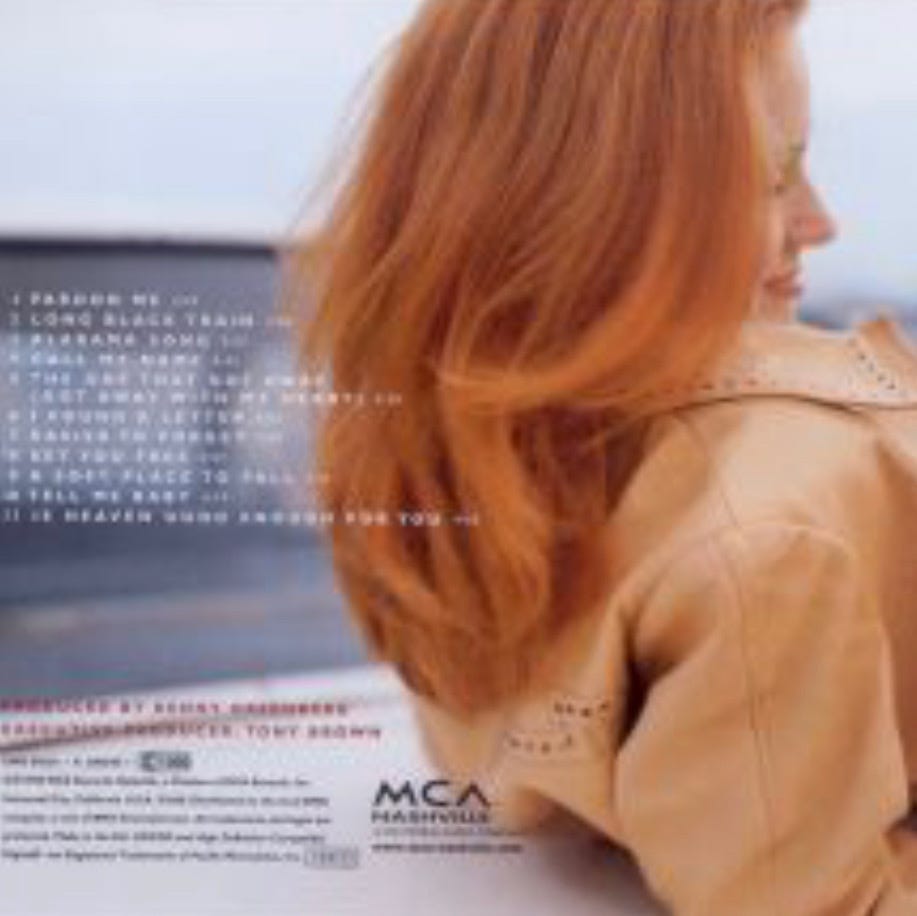This series, “On the Record,” will be a weekly Substack exclusive in which I’ll go through my recorded catalog song by song starting with my first album, Alabama Song, which was released on MCA Records in 1998. Photos will be attached if available and tolerable.
I just can’t recall the details of writing this song. I should’ve kept the notebooks but I guess I thought my memory would do, or maybe I didn’t think it would matter.
It does.
Note to self: Keep the notebooks. Hard drives don’t preserve the scribbling, scratching out, or the dates.
Nevertheless, what I do remember about “Call My Name,” is that it was one of four songs we recorded for Tony Brown/MCA Records in 1997 when I got the development deal that I told you about in installment #1 of this series — the other three songs were “Pardon Me,” “Long Black Train,” and “The House that Ruth Tore Down,” — a song written by Tim Carroll and John Sieger that I just loved but didn’t make the resulting album, Alabama Song.
I was twenty-four when we did that session. What can I even say about the material I was dealing with besides this: I can’t imagine what it was like to hear all of that sadness come out of such a young person. I was only ten or eleven years out from my parents’ deaths and it was obviously hovering over me but you couldn’t have told me that. I’d go so far now as to say it was what compelled me to make the art I was making in the first place — making art is how I heal. I have a friend who tells me I’m clairsentient and maybe she’s right — I’ve always felt closer to unseen presences than most other people report feeling. I feel that all over this song.
Because I can’t remember writing it, I can’t remember how it was constructed or who did what but this is another co-write with Butch, my then husband and collaborator. Most of the songs I recorded in those days (and certainly now) were definitely started by me, then I’d seek help finishing them or tweaking them in whatever way to make them “better.” Sometimes that was effective, sometimes it wasn’t. As I’ve said before, I wish I’d had more confidence in my own abilities and instincts and I wish I’d said no more often, but no regrets. It is what it is. The bottom line is I’m very proud of “Call My Name,” and think it holds up not only as a song, but as a very moving and soulful recording. It helped us establish a real sonic signature for the entire album — the National Steel guitar that Kenny Greenberg played instead of a standard acoustic guitar was not a sound anyone heard on mainstream Nashville records at that time. Nor was the dry vocal. I like the way my voice sounds — it’s so raw, so vulnerable.
But was I ever mainstream? I don’t think so. And Music Row didn’t think so. But the public did because that’s how I was positioned. But here’s the snag: because my record label didn’t think I had the sorts of songs that would get played on country radio, I didn’t get the promotion dollars needed to catapult me to a mainstream level. And because the public thought I was mainstream, I wasn’t really accepted into the alternative singer-songwriter crowd.
And that’s my early career in a nutshell. And in some way it explains my career as a whole and that no man’s land of not mainstream and not alternative is a place I still fight to stay out of.
As I was saying, no regrets. Because here’s the rest of the deal: some of the folks that were signed at the same time I was and DID have those sorts of songs that would get played on country radio and DID get the promotion dollars — well, they aren’t still making records. And I am. I played the long game and that ended up being the right decision for the kind of career I actually wanted. That’s something to be proud of and I can say that now that I’m forty-nine. That took a while. Special thanks to Tony Brown for signing me and letting me be myself, or at least the self that I could locate at that time in my life.
One of my favorite things about the recording of “Call My Name,” besides how lovely it sounds to my ears as a whole, is that the spectacular John Cowan sang the harmony parts with me. Y’all know him from New Grass Revival and his solo projects. And the other cool thing about it is this: it’s two takes put together. That might sound like no big deal to those of you who are used to working in digital formats, but we recorded this to two-inch tape, and I watched the engineer (Justin Niebank) slice it in two places with a razor blade and tape it back together. What had been two performances became one. I wonder if y’all can guess at what point the takes change?
Personnel:
Kenny Greenberg: National Steel guitar
Rick Plant: B Bender
Michael Rhodes: bass
Chad Cromwell: drums
Dan Dugmore: pedal steel guitar
Joe Spivey: fiddle
Allison Moorer + John Cowan: background vocals
Justin Neibank: engineer
Recorded at Universal Studios, March 1997.
Thanks to those of you who’ve requested “Call My Name,” during my livestreams. I’ve re-discovered it and have fallen in love with it again. There’s something about it that makes my center feel warm now, and I think that feeling is the love and longing that I felt for my parents then and the love and empathy I have for them now. It’s about them. It always was. I feel them in it so deeply.
Thanks for reading these “On the Record” installments. I’m so enjoying writing them. I’ve made ten studio albums so that means I’ll end up covering more than one-hundred songs! More to come next week.
AM
?si=544cdfc376714384






I look forward to each and every single one of these.
I love your perspective on your career, Allison. Standing in your truth is powerful and as you say, you were in it for the long haul, not a short flash-in-the-pan career that we've seen so much of out of Nashville. Thank you for sharing your thoughts. Beautiful song!